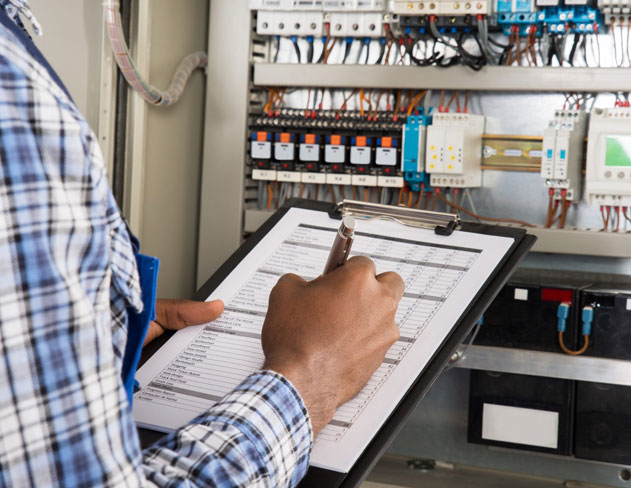Electrical Installation Condition Reports (EICRs) provide essential health checks for residential and commercial property, there is a difference between commercial and domestic EICRs.
Let’s cut through the technical lingo to explain the differences between domestic and commercial EICRs.
Understanding Electricians: Distinguishing Between Domestic and Commercial Roles
First, it’s important to understand that not all electricians are alike. While the electrician who rewires your home could slip into a commercial role and vice versa, the reality is often different.
Despite possessing similar qualifications, domestic and commercial electricians are specialists in their own right. Each are armed with unique skills and experience tailored to their specific environments.
Meet Domestic Electricians
When you think ‘electrician’, you likely see a domestic electrician. The lifeblood of home electrics, they keep everything humming. From fridge to TV, it all runs smoothly thanks to them.
In layman’s terms, domestic electricians use a single-phase supply. It’s a 230-volt AC current, handled via safe, flexible PVC-sheathed wiring.
What do they do? Keep your home appliances ticking over. Upgrade your fuse box. Conduct safety checks. Solve electrical snags, especially post circuit breaker trips. Simply put, they’re the unsung heroes of your home’s comfort and safety.
Introducing Commercial Electricians
Commercial electricians work in a different realm. They cover diverse settings: offices, schools, factories, retail shops. Each place calls for unique skills.
What’s on their plate? Setting up electrical systems. Regular maintenance. Managing complex security systems. They also ensure all electrical equipment meets strict safety standards like The Electricity at Work Regulations 1989.
Unlike domestic electricians, they operate on a three-phase power supply. It’s a heftier 400-volt AC current. Their toolbox? A range of specific cables. Steel wire armoured cable, fireproof cable, low smoke zero halogens, mineral insulated cable – you name it.
Their tasks go beyond basics. They manage server rooms, UPS systems, control panels, backup generators. In short, commercial electricians are the safe-keeping experts of the business world.
Unravelling the EICR: Your Electrical System’s Check-up
Have you ever pondered the health of your electrical system, be it at home or work? That’s where the EICR steps in. Think of it as a thorough health exam for your wiring.
In essence, a certified electrician performs the EICR. It’s an in-depth study of your fixed wiring. The goal? To find faults or hazards hiding in plain sight. Just as a doctor checks for disease signs, the electrician searches for potential electrical shock or fire threats. So, the EICR is a safeguard, helping you catch and fix dangers before they escalate.
Domestic EICRs
Bringing an EICR home means betting on safety. It’s like scanning every nook and cranny of your electrical system. This includes circuits, sockets, switches, and light fittings.
Despite the complexity, the EICR makes it simple for homeowners. It classifies defects into three easy-to-grasp categories: C1, C2, or C3. It’s a traffic light system for your safety. ‘Danger present’ gets a C1, ‘potential danger’ a C2, and ‘improvement recommended’ is tagged C3. With this clear system, you can swiftly fix issues and keep your home safe.
Commercial EICRs
In a business setting, an EICR gains more weight. It’s not just about safety here; it’s a legal must. Businesses have to regularly inspect and test electrical setups. This protects employees, clients, and the public.
EICR inspection frequency depends on the business type and its activities. For example, a factory may need more frequent check-ups than an office. This continuous scrutiny ensures that your electrical installations meet strict safety standards. It’s about safeguarding your premises and its people.
The Difference Between Home and Business EICRs
While both home and business EICRs target electrical safety, they aren’t identical.
Homes often deal with less complex electrical loads than businesses. A home has various appliances, but a business might have different machines, big lighting systems, hefty equipment, and more. This range of electrical uses ramps up risk in commercial areas.
And then there’s the question of rules. Businesses have specific guidelines to follow, some enforced by law. These rules aren’t the same as in homes, thanks to the varying complexities and risks. As a result, commercial EICRs usually need electricians with more specialised skills than domestic EICRs.
By knowing these differences, you ensure the safety of your space, be it a snug home or a busy business.
How to Pick Your Electrician: Key Points
Choosing an electrician, whether for home or business, is crucial. Here are some tips:
First, check their qualifications. A trustworthy electrician will have a nationally recognized certificate, like the City and Guilds qualification in the UK.
Next, consider their experience. Need a commercial EICR? Pick an electrician skilled in commercial settings. For a home EICR, go for an electrician with plenty of residential experience.
Finally, look for quality assurance. An excellent electrician can show proof of past successful jobs, glowing customer reviews, or a satisfaction guarantee.
Picking the right electrician helps keep your electrical system safe and efficient, at the very minimum they need to be qualified and competent.
The Last Say: Guarding Electrical Safety in Homes and Businesses
Let’s get to the point: an EICR isn’t just another check. It’s vital for electrical safety in your home or business. The details of what’s checked and how may differ, but the end game is a safe, effective electrical system.
Are you a homeowner seeking reassurance about your electrical fittings? Or a business owner complying with safety rules? Either way, an EICR is a must-have. Selecting an electrician with the right skills and experience is key to this process.
In this guide, we aimed to make clear the importance of EICRs, the differences between home and business reports, and how to choose the right electrician. We hope it hit the mark!

